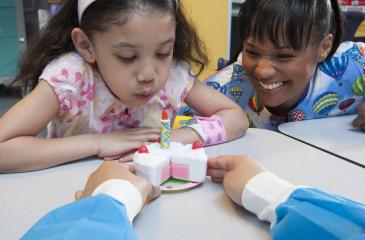Four University of Minnesota research projects have received awards to develop pediatric medical devices, thanks to support from two grant programs.
The programs’ partners, CTSI’s Office of Discovery and Translation (ODAT), and the Pediatric Device Innovation Consortium (PDIC), will provide awardees with funding and ongoing project support, including work strategy guidance, frequent feedback, and access to comprehensive internal and external services.
Both programs accept funding applications on an ongoing basis, and represent two of five CTSI ODAT funding programs.
Pediatric Device Development awardees
Two projects have been awarded funding and project support through the Pediatric Device Development Award Program, which supports the development of pediatric medical devices to ultimately improve pediatric outcomes and quality of life. Both projects are led by 2016-2017 Innovation Fellows with the Earl E. Bakken Medical Devices Center (MDC). A PDIC-CTSI-MDC partnership supports pediatric device innovation.
Congratulations to: Adam Choe, MS, Courtney Hill, MD, and Christie Traczyk, MS; Medical Device Center Innovation Fellows for their funded project titled, “Dental Fear and Anxiety.”
The project, which originated from PDIC and CTSI’s Community Discovery Program for Child Health Innovation, aims to develop an app-based educational program to reduce the fear and anxiety children have when visiting the dentist. Funding will support the development of an app prototype for testing in pilot dental offices.
The project was developed by the MDC Innovation Fellows as part of a PDIC-CTSI-MDC partnership, and received follow-on funding from MN-DRIVE to advance development efforts beyond the scope of work funded by PDIC and CTSI.Congratulations to: Hannah Bearinger, PhD, Christie Traczyk, MS, and Courtney Hill, MD; Medical Device Center Innovation Fellows for their funded project titled, “Optimizing Infant Nutrition Through Breastmilk Device.”
The project aims to develop a discreet, automated, wearable medical device for the stimulation, expression, and collection of breastmilk. Funding from the PDIC will support initial prototype development.
In addition to funding from the PDIC which will support initial prototype development, the project also received funding from the CTSI-administered Translational Product Development Fund (TPDF) to advance development efforts beyond the scope of work funded by PDIC.
Pediatric Device Breakthrough Collaborative Awardees
Two projects have been awarded funding and project support through the Pediatric Device Breakthrough Collaborative Funding Program, which supports collaborative University-industry teams so they can advance pediatric medical device technologies.
Congratulations to: Matt Ambrose, MD, Division of Pediatric Cardiology, Medical School Department of Pediatrics, in collaboration with One Heart Health and Children's HeartLink for his funded project titled, “A Telemedicine Solution for Congenital Heart Disease Screening in Low Resource Settings.”
The project will advance the development of a telemedicine system that helps local health providers identify signs of congenital heart disease in low-resource settings. Dr. Ambrose will collaborate with Children's HeartLink and One Heart Health on the project.
PDIC funding will support the development and testing of the system’s software platform component.Congratulations to: Tina M. Slusher, MD, Division of Global Health, Medical School Department of Pediatrics, and Ifelayo P. Ojo, MBBS, MPH, Division of Global Pediatrics, Medical School Department of Pediatrics, in collaboration with Maternova for their project titled, “Liquid Crystal Display Thermometer (LCDT) for Measurement of Infant Body Temperatures in Low-resource Care Settings.”
The project modifies an existing Liquid Crystal Display Thermometer (LCDT) ThermoSpot™—used to monitor infant temperature in low-resource care settings—to work across a broader temperature spectrum that can detect both fever and hypothermia. The project will be conducted in collaboration with Maternova, Inc.
PDIC funding will support development activities related to the adhesive, readability, and temperature scale of the LCDT.
Learn more about CTSI’s current funding opportunities, and PDIC’s approach for getting pediatric medical devices to market.
